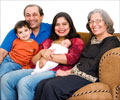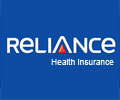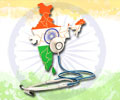Medical Facilites To Central Government Employees
27.1 The Central Government servants are entitled to medical facilities under the Central Services (Medical Attendance) Rules, 1944, the salient features of which are given hereunder:
27.2 These Rules are applicable to all government servants other than (i) those in Railway Service, and (ii) those of non-gazetted rank stationed in or passing through Kolkata, whose conditions of service are prescribed by rules made or deemed to have been made by the Central Government, when they are on duty, leave or foreign service in India or when under suspension. Following medical facilities are available under these rules in India only-
1. Avitaminosis and Hypovitaminosis.
2. Correction of squint (eye). Testing of eye sight for glasses of the employees once in three years
3. Disease(s) causing general debility and secondary anaemia.
4. Treatment for immunizing and prophylactic purposes in the case of communicable diseases only.
5. Venereal diseases and Delirium Tremens.
6. Treatment of sterility and operation for sterilization.
7. Medical termination of pregnancy performed at government hospital/recognized institutions etc.
8. Confinement including at residence if attended by Child Welfare and Maternity Centre staff; prenatal and postnatal treatment.
9. Blood and blood transfusion charges.
10. Dental treatment (only in government hospitals, private recognized hospitals) - Surgical operations needed for removal of Odon tomes and impacted wisdom-tooth, treatment of gum boils, extraction, scaling and gum treatment including pyorrhoea and Gingivitis, filling of teeth, root-canal treatment etc.
11. Anti Rabies treatment.
12. Cost of Hepatitis Vaccine B & C
Following treatment can be availed outside India also viz:
a) Cardio vascular Surgery
b) Kidney and other organ Transplant
c) Joint replacement and surgery
d) Bone-marrow transplant
e) Certain types of medical and Oncological disorders such as Leukaemia and Neo-plastic conditions.
f) Micro vascular and Neuro-surgery
g) Treatment with laser which obviates the need of open surgery.
h) Treatment with Argon, Krypton and Yag Laser in Ophthalmic cases.
i) Extra-corporeal stone disintegration by ultrasonic shock waves.
27.3 A government servant desirous of availing medical treatment outside India may make an application in the prescribed form through his Department/Ministry to the Standing Committee established under this rule. On receipt of such application, the Standing Committee, if after due consideration it is satisfied that the patient can be treated only outside India, may issue a certificate to the concerned Department/Ministry conveying its approval of the application and the concerned Department/Ministry shall, on the strength of that certificate incur necessary expenditure in getting the government servant concerned or the member of his family treated in accordance with the procedure laid down by the Committee (Rules 8 & 11).
27.4 For getting medical treatment by the Central Government servant and his family members in India, the following Hospitals/Institutions are recognized:
1. All State Government hospitals including those maintained by Local Bodies.
2. All hospitals, primary health centres, maternity and child welfare centres and dispensaries recognized by State Governments for treatment of their employees and/or members of their families.
3. All hospitals/dispensaries attached to Public Sector Undertakings/Projects/Port Trusts.
4. Cantonment hospitals in cantonment areas where there are no government hospitals, for treatment of government servants and their family members residing in those areas and also in the adjoining areas outside cantonment limits.
5. All railway hospitals.
6. Pay Clinics in Bihar, Punjab, Haryana, Uttar Pradesh, Madhya Pradesh, Rajasthan and Chandigarh.
7. Private hospitals in particular stations notified by the Government of India from time to time (Rule 2).
27.5 In addition to the above, Head of Department as specified in SR 2(10) is empowered to appoint Medical Officers under the employment of the Central/State Governments and Union Territories, as also Medical Officers not in government employment i.e. Private Registered Medical Practitioners as Authorized Medical Attendants.
27.6 Private Medical Practitioners are appointed as AMAs where adequate number of government doctors in various systems of medicines is not available or when their services are not available within a radius of five kilometres or because of the remoteness of the area (Rule 2). The AMA so appointed, will be bound by the terms and conditions prescribed by the government from time to time under these rules. If the condition of the patient so requires, the AMA can send the patient to the nearest specialist or other medical officer or summon them to attend the patient (Rule 5).
27.7 The treatment at the consulting room of the AMA is limited to ten days with a maximum of four consultations and normally ten injections. The limit of four consultations within 10 days is applicable for attendance with a Specialist/other Medical Officer and will count from the date from which the Specialist/other Medical Officer is consulted. Consultation on the 10th day of treatment is permissible, if no medicine is prescribed on that consultation.
27.8 Cases of medical treatment requiring hospitalization are referred to government/ recognized hospital. If hospitalization is not considered necessary but treatment is expected to be prolonged, the patient should be referred to OPD of government / recognized hospital.
27.9 When a patient consults the same AMA in regard to the super imposition of another disease during the course of treatment of one disease, it is regarded as a fresh consultation and will be charged at full rates as prescribed by the government from time to time. To justify a fresh claim for the recurrence of the same disease for a second time, there should be a reasonable gap between the closing of the first spell and the recurrence of the second spell. A separate claim is to be preferred in respect of each spell of illness and or an entirely new disease (GID (21) in Rule 2).
27.10 The claim for reimbursement should be received within 3 months from the date of last treatment. However, subject to certain conditions, the Department may condone the delay. (GIDs (9) and (10) Section-1).
27.11 The government servant and their family members may receive treatment for all diseases for which treatment is provided under the rules in a government/recognized hospital outside the district/state but within India, provided:
(i) Necessary and suitable facilities for treatment are not available in a government or recognized hospital at the district or state headquarters or within the district or state where one falls ill and
(ii) The treatment outside the district/state is recommended by the Authorized Medical Attendant and countersigned by the Chief Medical Officer of the district if the treatment is undertaken outside the district or by the Chief Administrative Medical Officer of the state if it is to be undertaken outside the state. (G.I.D. (4) under Rule 6).
27.12 Traveling Allowance for medical treatment and attendance The government employees and their family members are entitled to undertake journeys to take appropriate medical attendance and treatment, if it is certified by the AMA/Specialist/Medical Officer attached to the hospital to whom the patient was referred, that the journey was unavoidably necessary to obtain the treatment. The patient (government servant or his family member) and attendant also (wherever recommended) will be entitled to TA plus DA for the period of journey undertaken by rail, road, sea and air. No DA will be admissible for halt.
The government servant is eligible for reimbursement of the traveling expenses of the donor of a kidney to him or to a member of his family for the journeys made in connection with the transplantation.
27.13 Central Government Health Scheme (CGHS)
The medical facilities under the Central Government Health Scheme are available to all the employees paid from the civil estimates and their family members residing in the area covered by the scheme. An employee can opt out of the scheme and avail of the medical facilities provided by the employer of his spouse. If an employee or a member of his family covered under the Scheme falls ill at a place not covered under CGHS, the treatment shall be admissible under CS(MA) Rules1[1].
27.14 The medical facilities to the Central Government employees and their dependent family members are provided under the Central Government Health Scheme in the following cities:
Ahmedabad, Ghaziabad, Meerut, Allahabad, Gurgaon, Mumbai, Bangalore, Guwahati, Nagpur, Bhubaneshwar, Hyderabad, Noida, Kolkata, Jaipur, Patna, Chennai, Jabalpur, Pune, Kanpur, Ranchi, Delhi, Faridabad, Lucknow, Shillong, Thiruvananthapuram. 1[1] OM No.S.1101/6/92-CGHS Desk-CGHS(P) dated 4.8.94.
27.15 Definition of Family: ‘Family’ means employee’s
(i) Husband/Wife including more than one wife and also judicially separated wife.
(ii) Parents and Stepmother
In the case of adoption, only the adoptive parents and not the real parents are included under the ambit of CGHS. If the adoptive father has more than one wife, then CGHS cover is applicable to the the first wife only.
A female employee has a choice to include either her parents or her parents-in-law and such a option exercised can be changed only once during service.
(iii) Children including legally adopted children, stepchildren and children taken as wards subject to the following conditions:
Son - Till he starts earning, irrespective of age limit.
Daughter -Till she starts earning or gets married, whichever is earlier, irrespective of age-limit.
Son suffering from Permanent disability of any kind (physical or mental) – There is No age-limit imposed in this case since such an individual becomes a dependant for the latter or remaining part of his life.
(iv) Widowed daughters and dependent divorced/separated daughters
(v) Sisters including widowed sisters.
(vi) Minor brothers and dependent brothers
27.15.1 But the above persons should reside with the government servants and their income from all sources accounted together should not be more than Rs.1500/- per month2.
27.16 Contribution
A compulsory monthly contribution is charged from all the entitled classes of government servants on the basis of rates fixed by the government from time to time. The present rates of contribution are as under:
Pay Rate of monthly contribution (Rs.)
- Up to Rs.3000/
- Rs. 15/-
- Rs.3001 to 6000/
- Rs. 40/-
- Rs.6001 to 10000/
- Rs. 70/-
- Rs.10001 to 15000/
- Rs. 100/-
- Rs.15001/- and above
- Rs.150/-
2[2] OM No.NB 12014(7)/92-CGHS(D) dated 31.12.1993.
27.16.1 When both husband and wife are Central Government servants covered by the scheme, the contribution will be recovered from only one of them whose pay is higher.
27.16.2 An employee transferred to another CGHS station or one who goes to serve abroad leaving his family at the old station may continue to pay the contribution and his family can avail the facilities at the old station for that duration.
27.17 Facilities available under the Scheme
i) Medical attendance including consultation with the AMA at a CGHS Dispensary.
ii) X-Ray, Laboratory and other diagnostic facilities at CGHS Laboratories or other laboratories of CGHS wing of Hospitals/Private Hospitals recognized by CGHS.
iii) Hospital services in the CGHS wing of Hospitals/Referral/Private Hospitals recognized by the CGHS.
iv) Nursing Home facilities for those having a basic pay above Rs.12000/-.
v) Special treatment for diseases like TB, Cancer, Kidney Transplant and By-pass Surgery and facilities for Dental treatment (for few diseases).
vi) Antenatal/confinement/post natal care facilities.
vii) Specialist consultation in selected centres/poly clinics/hospitals etc.
viii) Intra - ocular lens implantation/treatment and cost of spectacles after cataract operation.
ix) Post-operative treatment relating to Neurosurgery, Cardiac Diseases, Cancer, Kidney transplantation and hip/knee replacement surgery in the same institutions/hospitals where the surgery was earlier carried out with prior permission of CGHS.
x) Medicines prescribed during OPD treatment are provided by the CGHS dispensary concerned. No reimbursement is allowed for such medicines purchased from outside.
xi) The scale of hospital accommodation is prescribed as under:
Basic Pay Private Hospitals recognized by CGHS
AIIMS,
New Delhi
Government/Municipal hospitals
- Upto Rs.7500
- General Ward
- 7500 and above
- Nursing Home facilities
- 7501 to 10500
- Semi-private Ward
- 10501 to 13499
- Private Ward
- 13500 and above
- Deluxe Ward
27.18 Procedure for reference to Referral/Recognized Hospitals under CGHS
The beneficiaries will have the option to avail specialized treatment at CGHS recognized hospitals of his/her choice if the specialist of the CGHS dispensary or government hospital recommends the patient for such specialized treatment.
27.18.1 After the specialist advises a procedure in writing, the permission letter for taking such treatment in a CGHS recognized private/referral hospital of the choice of the employee in the same city, would be given by the parent department/office.
27.18.2 In case the beneficiary, in spite of the facility being available in the city still chooses to get treatment in another city, permission of the CGHS authorities of the city would have to be obtained. In such cases, no TA/DA will be paid by the government.
27.18.3 The government servant is allowed to take treatment from referral/recognized hospitals under CGHS in emergency. However, the term #$#emergency#$# will be decided by the Additional Director, CGHS concerned whether the case is/was of real #$#Emergency#$# before reimbursement is made by the parent department on the basis of rates fixed by the CGHS from time to time.
27.18.4 Ex post facto permission for treatment in government referral hospitals like PGI Chandigarh etc. can be given by the parent department.
27.19 Medical Advance - The medical advance to the serving government servant for self treatment or treatment of the dependents on receipt of estimate from the treating doctor of a government/recognized hospital is available subject to the following conditions:
i) Rs.10,000/- or the amount recommended by the doctor, whichever is less for indoor treatment in hospital and for OPD treatment in case of TB/Cancer.
ii) In case of major illness like by-pass surgery, kidney transplant etc., the advance may be limited to 90% of the package deal wherever it exists or the amount demanded by the hospital concerned.
iii) The advance is paid directly to the hospital concerned on receipt of an estimate.
iv) For settlement of advance, the employee concerned may be required to submit the adjustment bills within a period of one month from the date of his discharge from the hospital. In case the entire advance has not been utilized for the treatment of the patient, the head of office concerned will correspond with the hospital for refund of the unutilized balance of medical advance.
27.20 Settlement of Claim - The government servant is required to prefer claim/bill within 3 months, from the date of discharge from the hospital. If the claim gets time barred, relaxation of delay is allowed by the department depending on the circumstances of delay.
27.20.1 The claim should have the following documents completed:
a) Claim Form Med. #$#97#$# and Essentiality Certificate ‘A’ for Outdoor treatment and #$#B#$# for Indoor treatment.
b) All original bills verified by the treating doctor with his stamp.
c) Photocopy of CGHS Token Card.
d) Discharge Slip of the Hospital in case of Indoor Treatment.
e) A detailed list of all medicines, laboratory tests, investigations, number of doctors visits etc.
f) Self explanatory letter from the beneficiary explaining the emergency circumstances in case of emergency.
g) Legal heir certificate in case of death of the card holder.
27.20.2 Based on the rates fixed by the CGHS, the admissible amount is worked out by the department. If the rates claimed by the concerned are less than the rates fixed by the government, the actual amount is reimbursed. In case CGHS rates are not available for a particular item, the reimbursement is allowed on the basis of rate list of AIIMS. Incidentally, where AIIMS rates are also not available, the actual amount paid by the patient is reimbursed. Items mentioned in the list of inadmissible items under CS (MA) Rules are not reimbursable. Special Nursing Charges are to be reimbursed as fixed by the Ministry of Health from time to time.
27.20.3 In normal cases, AO(A)/AO(E)/SsP up to the amount of Rs. 1000/-, DIsG up to the amount of Rs. 5000/- and JDs up to the amount of Rs. 10000/- are empowered to accord sanction for reimbursement. In other cases claims are submitted to DCBI through JDs concerned for consideration.
CGHS – Pensioners
Senior Citizens are a treasure to Indian society and hence should be treated with respect. They have worked hard all these years for the development of the nation as well as for the community. They possess a rich and vast experience in different walks of life. The younger generation or the youth of today can gain much insight from the rich and diversified experience of the senior citizens and their contribution by taking our nation i.e. India to greater heights. At this age of their life i.e. during their old age, such individuals need to be taken care of and made to feel special. As per the Indian traditions, senior citizens are given a special place in the Indian Society and are revered with due respect, irrespective of any social bias. The Indian Government provides several benefits and incentives through various schemes in various sectors of development, specially introduced for the welfare of the senior citizens. All individuals 60 years and above are included under the category of senior citizens.
With various tax benefits, travel and health care facilities provisioned for them, Indian Government has created numerous reasons for the Senior Citizens to feel happy and elated.




![An Introduction - Indian General [Non-Life] Insurance Companies An Introduction - Indian General [Non-Life] Insurance Companies](https://www.medindia.net/images/patientinfo/120x100/health-insurance21.jpg)

















Respected sir,
one of out official's wife got treated in Max super speciality Hospital , Patparganj during 4.3.2018 to 6.3.2018 towards treatment of 'RT Loower UretericStricture RT secondary PUJO RT Renal Calculus . Where in their billing Hospital has charged for 'Ureteric Catherterisation 50 % is of Rs. 4927/- while as per CGHS Code No. 746 [2014 ] rate is mentioned as Rs. 794/-. The clarification and correct rate is of the procedure may please be given.
Ajay Sharma
Finance HQ
National Productivity Council
Lodhi Road N Delhi
I have read some excellent stuff here. Certainly worth bookmarking for revisiting. I wonder how so much attempt you place to make this type of fantastic informative web site. Dental Hospital in Hyderabad
Complain from the TEACHERS of Kendriya Vidyalaya Sangathan KOLKATA REGION.
As a capacity of THE GENERAL SECRETARY, AIKVTA, Kolkata Region, I am complaining against The Additional Director CGHS, Kolkata. Earlier 25 years CGHS facility was continued but now it was stopped from few months and teachers are debarred to avail the CGHS facility. This facility is continued in other metropolitan towns like Mumbai, Delhi, Chennai and other places where this facility is available. We are deducting CGHS contribution every month from salary but By order of The Additional Director CGHS, Kolkata, Wellness Hospitals refused to give treatment. So, I beg for issuing order for treatment of K.V. teachers in CGHS of Kolkata Wellness Center.
yes I read this paragraph fully about the resemblance of most up-to-date and earlier technologies, it's amazing article. Feel free to visit my homepage Best Dental Hospital in Hyderabad .
Hi All, I am an IT professional and the new proposed scheme looks like the best. CGHS has many draw backs like should be in city to get cards, not all states have good hospitals. Big headache with reimbursement. Modi is doing good job tweet him to support new insurance scheme instead of CGHS which might speed up the process and all employees and retired employees will get insurance cards which never expires in there life time and cashless benifits